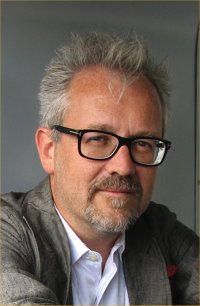Simon Ings: Hyperreal

Simon Ings was born July 1965 in Horndean, Hampshire, England. He attended King’s College in London, where he studied English. His first SF story was ‘‘Blessed Fields’’ (1989). Debut novel Hot Head (1992) and sequel Hotwire (1995) were cyberpunk, of sorts. Other works of SF include City of the Iron Fish (1994) and Headlong (1999). Painkillers (2000) is a thriller with some SF elements, while The Weight of Numbers (2006) and Dead Water (2011) are big, ambitious literary works. He returned to SF with Wolves (2014), about augmented reality. He also wrote non-fiction The Eye: A Natural History (2007). Ings edits Arc, the SF magazine produced by New Scientist, where he also works as a culture editor.
‘‘I work for New Scientist as their culture editor. I’m running around, going to openings and reading books and interviewing people and things like that. That’s me, really. No gigantic foreign adventures or anything, I’ve just been nose to the ground. No foreign legion service, sadly. Because I get out so infrequently, it means that when I do get out it tends to get written up in my science fiction. Basically me on my holidays is my entire science fiction output. And then I misuse notes, so if I have to write about Havana I take notes from Blackpool, and put them in Havana. Then everyone runs around going, ‘That’s an incredible vision of Havana! How futuristic it looks!’ I say, ‘Thank you, that’s my job. Leave your money at the door and go.’ ”
…
‘‘I made a very big deal about leaving science fiction. I just hated everyone. I hated the people I collaborated with. I hated my publisher. My publisher hated me. I was getting low sales. After a while of moaning and sitting under the beer tap grumbling, it suddenly dawned on me that I was being a screaming narcissist, because in SF, you’re a big fish in a small pond within seconds. You get talked up and your sales are tiny. Your actual fan base, your readership, is tiny. But you’re made to feel as if you’re the best thing since sliced bread. I think I was quite a weak character then. I never really had to grow up because I started writing young. I had success pretty quickly. I was being published before I was 25. Proper novels with proper publishers, which is nice. The assumption I suppose was, ‘Oh, he’s swanning off to be literary because he thinks he’s too good for us.’ What I was doing was the reverse: getting out of an environment where I was far too comfortable. I realized that I didn’t hate anyone: I hated myself as reflected by the genre. I didn’t want to be this formlessly promising twit. I just wanted some time on my own to do something odd, different, and away from that very tight community. It panned out. I was very happy to do that. It meant that I acquired a non-fiction career as well as developing a really odd novel style, which I can always come back to.”
…
“The reason all creative industries are full of people who are no good is because they have the calling, they have the passion, they have the love, and they have the good will – but they have no ability to realize they’re no good. It’s just not there. My ex is the agent for Lawrence Durrell’s estate. What’s interesting about Durrell is the amount he threw away. This was a man who could write for his country. He was extraordinarily prolific. But although his body of published work is quite extensive, it’s really tiny compared to what he churned out, and he was very good at throwing stuff away. Because it’s been his centenary, every squirrelly academic from every Midwestern college is saying, ‘There’s this lost Larry Durrell manuscript that we must publish!’ The house is full of bad Larry Durrell, and the agency and the estate are constantly turning down these academics. ‘He threw this away. The only reason he didn’t discard it in a bin is because he’s a writer and he might need that scene later. This is not for publication.’ That’s part of the writer’s job. They published an unpublished John Wyndham novel. There’s a reason why it was unpublished. It does him no service whatsoever, because that’s now part of his canon, which is ridiculous because he couldn’t make it work.”
…
“When I started Wolves, augmented reality seemed to be about taking things in and out of the picture plane and creating gamelike environments. By the time I finished Wolves, though all those things are still true and interesting, the whole conversation has moved into Google Glass, which is about taking your personal experience through time and selling it back to you as a commodity. That’s a completely different book. If you started the story talking about, ‘I wonder what Google is doing?’ you would be royally screwed because those guys turn on a penny. For the same reason, when I wrote Wolves, I took out every cultural signifier I could. There are recognizable places in there, but I don’t name them. The character names are not English, they’re pan-European. I reached for names that could work across Europe – names like ‘Anna’ that are culturally unspecific. ‘Conrad’ as well. When you do that, you get this weird shimmery discomfiting but hyperreal surface, which is something I absolutely adore. It doesn’t have a science fiction/fantasy quotient, but the political and geographical references have been rigorously stripped out. It’s not easy to do. You end up with something magical-feeling and odd. It is a literary novel, but it would be insane to sell it that way. It’s way better to say it’s a science fiction novel, knowing the science fiction readership is now so dispersed and so well read that they’ll get what you’re trying to do without difficulty, and will provide a larger readership and a larger conversation. It seemed perfectly natural to publish it as science fiction, even having sworn I’d never do that again. Time moves on and people move on. I want to reach science fiction readers now.”
…
“To be honest, the future of digital is print. The economics of small editions are fantastic. Print distribution isn’t going away, and people are waking up to the fact that there’s this fantastic engine running slightly on idle at the moment, because publishing is in a fairly difficult state. All of that warehousing and distribution is a network that must not be thrown away. Distribution is an interesting industry to be in – not easy, but interesting. The other thing is, people hate buying products that give them nothing to show for their purchase. You can’t give an e-book to your children. We’ve evolved to wander a fair number of miles a day, and within that acreage know pretty much where everything is. The idea that we can more effectively engage with the world via a screen that’s three inches by two…. It’s not even insane. It’s not clever enough to be insane. The most famous scientific put down is, ‘This isn’t even wrong.’ That’s just the best line. There is no right way of doing things, that’s the appalling thing. Arc is an exercise in servicing formats that die just as we release the magazine. We’ve tried to service everything. We’ve gone through so many ways of doing the magazine that seem daft now but seemed sensible at the time. There was a time when it seemed easy to address every e-reader and produce files for everyone. That day is really gone. The correct answer to someone who doesn’t own an iPad is, ‘Buy an iPad.’ It’s not okay to expect us to service your Breadfruit 3-9000.”





